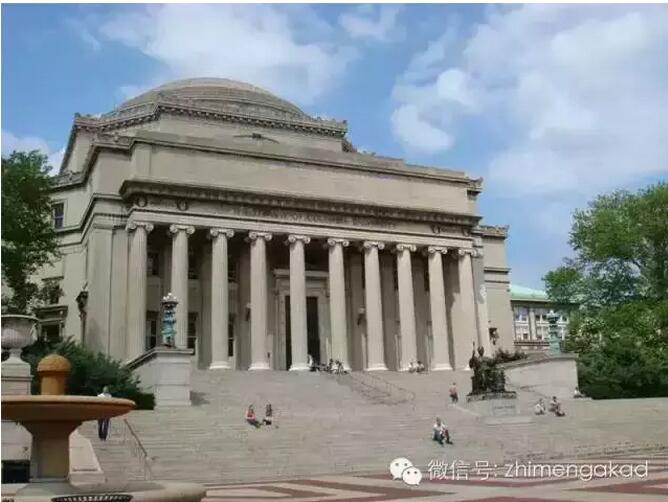【智梦外籍专栏】我不是一个“花心”的女人|智梦顾问原创

小编:和中国大学相反,美国大学都是在大二甚至大三的时候才要求学生定下专业。因此,同学们可以在刚开始的两年里尽情地探索各个感兴趣的学科以及之后可能的就业方向,慢慢挑选自己本科学术上的“另一半”。也正因为这个灵活性,使得同学们开始不断地思考、询问自己:真正感兴趣的东西是什么,以后想要成为怎么样的人、过什么样的生活,怎样才能让自己有意义的活下去。接下来,让我们听听智梦外籍顾问Sophie的经历,看看她是如何做出了从数学专业到英语写作的这个转变。
作者介绍:Sophia Griffth, 毕业于哥伦比亚大学,主修英语写作,辅修心理学。纽约WorkPath助理研究员,哥大SCAN Lab助理研究员。
Why I Walked Away From Math and Embraced the Liberal Arts
我为何离弃了数学而走入博雅教育的怀抱
In high school, I loved math. I got an A in every math class. I went to math club. In sophomore year I doubled up on math classes, just for fun. I participated in the AMC 10, and received the highest score in my school. In Junior Year, I took AP Calculus; I doodled integral equations and graphed 3D surfaces on napkins when I was out with friends. In the chaotic world of high school, I loved how much sense it all made. Here were problems I could actually solve.I felt proud of my love of math, too, because it challenged the stereotype I’d grown up hearing, that women are bad at math.
在高中的时候,我非常热爱数学。每节数学课都能拿A,还在课外参加了数学社团。高二的时候(美国高中四年),仅仅是因为兴趣,我上了双倍的数学课。那一年,我还参加了全美数学竞赛,拿了全校最高分。高三的时候,我上了AP的微积分。在和小伙伴们一起出去玩耍的时候,我在餐巾纸上计算着积分方程和画3D草图。在高中那几年喧嚣的生活里,我爱上了数学的逻辑性,因为我可以逻辑得运用公式推算出答案,从而解决问题。同时,我也为我对数学的热爱而感到骄傲,因为它挑战了我从小到大听到的偏见:女人天生数学差。
The first math class I took in college was probably the best math class I ever took: Linear Algebra. It was the culmination of everything I’d loved about math in high school: each concept built upon the last to create a logical, orderly world that existed only on paper. Sadly, though, this would be the last math course I ever took. The following semester, I dropped my Multivariable Calculus class, and never looked back.
在大学里上的第一节数学课,线性代数,或许是我这辈子上过的最棒的数学课。它包含了我在高中数学学到的所有喜欢的东西:每一个概念依次叠加,创造出一个只在纸上出现的、讲逻辑而又有秩序的世界。令人遗憾的是,这节线性代数同时也是我上过的最后一节数学课。在接下来的学期里,我没有继续上多元微积分。
How did this happen? It wasn’t as sudden as it sounds. As much as I’d enjoyed math up until this point, another part of me always felt shiftless. I had no purpose. College, I felt, was where I needed to figure out what I wanted to be, and I quickly realized that for all my love of algebraic properties, my future was not that of a mathematician. Or an accountant, or an actuary, or a statistician. It was hard to let go of math, but I felt strongly that I needed to start exploring.
为什么会这样呢?其实这并非事发突然。在我和数学“热恋”时,另一个我感到不安和迷茫,因为我并不知道我人生的目标是什么。大学本应该是一个让人发现自我,找到理想的地方。尽管我一直热爱代数, 但是我渐渐意识到以后我并不想做一名数学家,或会计师,精算师,数据分析师。放下数学不是一件容易的事情,但是我强烈的感受到我需要探索其他领域。
Between then and now, I have taken coursework in philosophy, sociology, literature, film studies, history, religious studies, art, psychology, and writing. For a long time, I struggled because I couldn’t make my interests fit into one major or a clear-cut career like “lawyer” or “CEO.” It wasn’t until I spent some time working and volunteering as an educator that I figured out what all my interests had in common: I wanted to help people live a better life. Problems in the real world are much more complicated than mathematical ones, but through my studies I hoped to make sense of them, and in my future maybe help solve them. Once I realized this, every class I took seemed relevant and important to me.
从那时起,我上过哲学、社会学、文学、电影、历史、神学、艺术、心理学和写作的课程。在很长一段时间里,我都很苦恼,因为我无法把我感兴趣的东西放到一个专业里面,亦或是是很清晰的想当律师或者CEO。后来直到我做志愿者,实习当教育者的时候,我才发现我热爱的是(通过教育)帮助人们过上更好的生活。现实生活中的问题比数学题复杂很多,但是通过大学的教育,我了解了这些问题,希望以后能够尽我所能解决它们。自从我找到了我的理想,我上的每一节课都变得有意义。
Sometimes, I feel embarrassed that I didn’t stick with math: it’s so easy to measure the difference that mathematicians make. But then I remember how far I’ve come in my understanding of the world, and how much I’ve accomplished already, and I know that I’m doing something equally important.
有时候,我对我没有坚持数学而感到遗憾,因为数学家(为世界)做的改变是那么明显。但是每当我回想起我是如何一步一步地理解世界,如何运用这些认知解决人们问题的时候,我便坚信我在做着(和数学家们)同样重要的事情。
编辑、翻译:欣茵